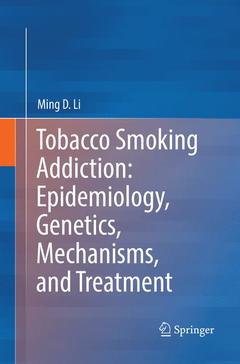Description
Tobacco Smoking Addiction: Epidemiology, Genetics, Mechanisms, and Treatment, Softcover reprint of the original 1st ed. 2018
Author: Li Ming D.
Language: English
Subjects for Tobacco Smoking Addiction: Epidemiology, Genetics...:
Approximative price 116.04 €
In Print (Delivery period: 15 days).
Add to cartPublication date: 01-2019
Support: Print on demand
Approximative price 158.24 €
In Print (Delivery period: 15 days).
Add to cartPublication date: 03-2018
Support: Print on demand
Description
/li>Contents
/li>Biography
/li>Comment
/li>
The Prevalence of Smoking and Its Associated Diseases.- Addiction Genetics: Basic Concepts and Techniques.- Estimation of Genetic and Environmental Contributions to Smoking Addiction.- Identified Susceptibility Loci for Nicotine Addiction Based on Genome-Wide Linkage Analyses.- Involvement of Variants in Gene Clusters CHRNA5/A3/B4 on Chromosome 15 to Smoking Behaviors and Lung Cancer.- Contribution of Variants in CHRNB3/A6 Gene Cluster on Chromosome 8 to Smoking Dependence.- Genetic Contribution of Variants in GABAergic Signaling to Nicotine Dependence.- Contribution of Variants in DRD2/ANKK1 on Chromosome 11 with Smoking and Other Addictions.- Significant Contribution of Variants in Serotonin Transporter and Receptor Genes to Smoking Dependence.- Converging Findings from Linkage and Association Analyses on Susceptibility Genes for Smoking Addiction.- Contribution of Gene–Gene and Gene–Environmental Interactions to Tobacco Smoking.- Identification of Biological Pathways Associated with Smoking Initiation/Progression, Nicotine Dependence, and Smoking Cessation.- Neuroproteomics and Its Applications in Research on Nicotine and Other Drugs of Abuse.- Regulatory Roles of MicroRNAs in Addictions and Other Psychiatric Diseases.- Tobacco Smoking, Food Intake, and Weight Control.- Nicotine Modulates Innate Immune Pathways via α7 Nicotinic Acetylcholine Receptor.- DNA Methylation Analysis Reveals a Strong Connection between Tobacco Smoking and Cancer Pathogenesis.- Evolutionary Relations of Genes Encoding Nicotinic Acetylcholine Receptor Subunits.- Management, Pharmacotherapies, and Precision Medicine for Smoking Cessation.- Background and Biology of and Health Concerns about Electronic Cigarettes.- Grand Challenges and Opportunities for Psychiatry, Including Nicotine Addiction Research.
Dr. Ming D. Li is the National Distinguished Professor of Genetics and the Director of Genomics and Bioinformatics Center at Zhejiang University School of Medicine in China and Vice Director of Pharmacogenomics for the Institute of Neuroimmune Pharmacology at Seton Hall University in New Jersey. Prior to accepting these appointments in 2015, for more than 10 years, Dr. Li was the Jean and Ronald Butcher Distinguished Professor, Head of Neurobiology Section, and Vice Chair of Research for the Department of Psychiatry and Neurobehavioral Science at the University of Virginia. He has been an advisor or board member for a dozen research centers/programs at various universities in both the USA and China and a member of several editorial boards, including serving as the Editor-in-Chief for Frontiers in Molecular Psychiatry. He also has been an ad-hoc reviewer for more than 40 scientific journals. He is a member of many national and international scientific societies and was elected a full member of the American College of Neuropsychopharmacology. His scientific contributions have been numerous and varied but have always focused on the genetics and biology of drug addiction, especially on nicotine dependence. His research has revealed not only susceptibility loci for smoking dependence, but also common susceptibility loci for multiple other addictions. Prof. Li has published more than 200 peer-reviewed papers in neuropsychopharmacology and molecular pharmacology, molecular and statistical genetics, computational biology, and bioinformatics. The journals he has published in include some particularly prestigious ones such as the American Journal of Human Genetics, Molecular Psychiatry, Neuropsychopharmacology, Nature Genetics, and Nature Reviews Genetics.
Providing the most recent knowledge on almost all key aspects of the health impact of tobacco smoking
Focusing on both preclinical and clinical studies
With ample figures and tables




